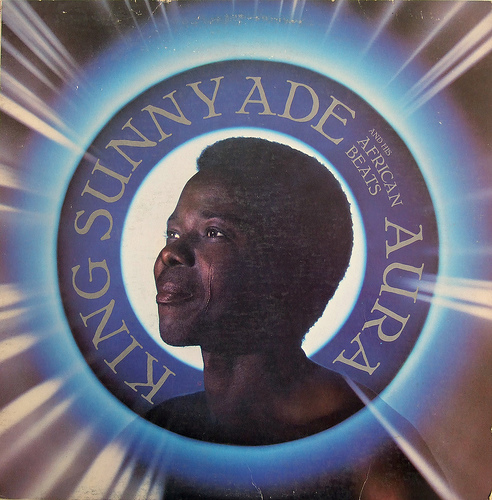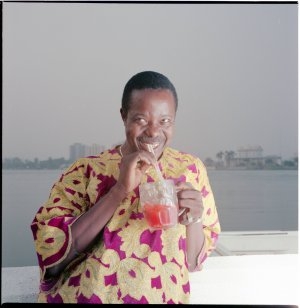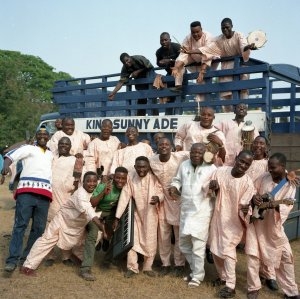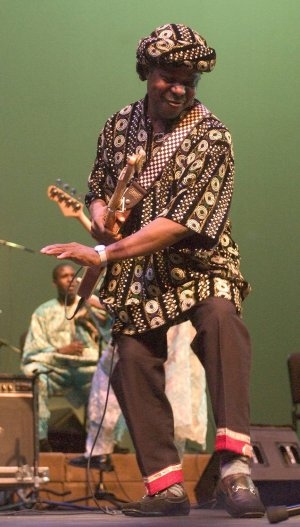
 BY DAVE ALLEN At age 62, King Sunny Ade is my parents’ age, and there’s no way I could see dear old mom and dad touring internationally or jamming for hours on end. Of course, they didn’t introduce the world to a form of music — juju, the guitars-and-drums-powered music of Nigeria’s palm-wine parlors. King Sunny’s music still has the same punch and arresting but upbeat complexity as when it burst out of his native land onto the global scene more than 30 years ago, and the energy in both the tunes and in the King himself is a marvel. Born Sunday Adeninyi, King Sunny plays a mean lead guitar, sing lyrics in his native Yoruba, and leads a band of more than a dozen players. He’s popular across a large, incredibly diverse country that’s growing in wealth and stature each year. When I spoke with him, he was in Winnipeg, Manitoba, and they’ll still be jangling north of the border when he plays across the river in Camden tomorrow night. We spoke about his longevity, new audiences for his music both at home and abroad, and about continuing the legacy of his ancestors with a few modern tweaks.
BY DAVE ALLEN At age 62, King Sunny Ade is my parents’ age, and there’s no way I could see dear old mom and dad touring internationally or jamming for hours on end. Of course, they didn’t introduce the world to a form of music — juju, the guitars-and-drums-powered music of Nigeria’s palm-wine parlors. King Sunny’s music still has the same punch and arresting but upbeat complexity as when it burst out of his native land onto the global scene more than 30 years ago, and the energy in both the tunes and in the King himself is a marvel. Born Sunday Adeninyi, King Sunny plays a mean lead guitar, sing lyrics in his native Yoruba, and leads a band of more than a dozen players. He’s popular across a large, incredibly diverse country that’s growing in wealth and stature each year. When I spoke with him, he was in Winnipeg, Manitoba, and they’ll still be jangling north of the border when he plays across the river in Camden tomorrow night. We spoke about his longevity, new audiences for his music both at home and abroad, and about continuing the legacy of his ancestors with a few modern tweaks.
PHAWKER: Do you remember the first time you played in the United States?
KING SUNNY ADE: I would say it was 1975. During those years we would normally play as a cultural exchange, not like the concerts now. Through the governments, the musicians would come from the US to Nigeria and then from Nigeria to the US. We called it a cultural exchange. Now it’s a different thing, it’s not just government to government.
PHAWKER: What has been your experience playing for American audiences?
KING SUNNY ADE: In those days, only a few people would know, they’d hear King Sunny Ade is coming to town. The people heard through organizations or through the government. Now there are more people who would like to see and hear our music. In 1984, it started getting larger and larger.
PHAWKER: You’re known for long jams, long stretches of uninterrupted playing. Can American audiences keep up?
KING SUNNY ADE: Well, we can do it, but unfortunately they normally only allow a little time. We are used to playing for several hours at a time.
PHAWKER: Are we any good at dancing? Can we keep up with you that way?
KING SUNNY ADE: Well, normally we have dancers, but sometimes there is no room for it. If we are in doors and there is no space for it, people will dance in the lobby or on the sides of the seats. It depends on where we are and if we have an open floor.
PHAWKER: Juju is rooted in talking drums and electric guitar. Obviously you’ve made your career as a guitarist, but did you ever play drums?
KING SUNNY ADE: Oh yeah, I played drums. I was a percussionist when we started. I wanted the talking drum to be a constant thing, so now I have somebody else to play it.
PHAWKER: Your songs require a lot of musicians on stage. How do you lead them? How do you keep them together?
 KING SUNNY ADE: Really, we are like brothers and sisters in that we have honesty and a free mind. We love what we do, and we feel like brothers who are staying together in a hostel or a school campus. We don’t have any religion among us. We believe in the music and in playing the music rather than in politics or doing religion. You know, in the group we have non-believers, we have Muslims, we have Christians. The music binds us together.
KING SUNNY ADE: Really, we are like brothers and sisters in that we have honesty and a free mind. We love what we do, and we feel like brothers who are staying together in a hostel or a school campus. We don’t have any religion among us. We believe in the music and in playing the music rather than in politics or doing religion. You know, in the group we have non-believers, we have Muslims, we have Christians. The music binds us together.
PHAWKER: How has Nigeria changed since you began your career? How have audiences changed? Are they more into new forms of music than juju?
KING SUNNY ADE: In Nigeria, it’s growing, growing, growing every day. We have more audiences. I’m now playing for the third generation. It was the first generation when we started, and they became the father, and now I’m playing for their grandchildren. In my country, anything comes to work. They believe the new work, and they will stick with it. Like R&B, they love R&B, and the jazz as well, and we keep on modifying it to make it look good. There’s always a new one coming out, and everybody will still love it. In Nigeria, most of the music that’s coming out now is mostly through computers, so it’s not as normal that people will go out and dance to it. I don’t condemn the new music that is coming out every day, though.
PHAWKER: Do all people in Nigeria understand Yoruba, or is there a language barrier for Nigerian audiences?
KING SUNNY ADE: Music has no language, or it has a universal language. What you need to do is play good music. In Nigeria, we play in the north and the east and the south and the west, and we have music that really binds us. It’s only the name and the style of music. If we go to the west of Nigeria, we will sing in their language, the Igbo language, and they will clap and dance to it. The only difference is in their mind.
PHAWKER: How about for American audiences? Do you take time to explain what your lyrics mean?
KING SUNNY ADE: I do, occasionally, but everybody, they’re all there for the music. They don’t have any  problems.
problems.
PHAWKER: Does a juju musician grow up learning how to play the music, or can it be taught later on?
KING SUNNY ADE: Some of them still play when they’re young, and some of them listen to different groups later on. Some of them want to play for a certain group or join them as an apprentice. It’s very possible to learn it later. The more you listen, it’s very easy.
PHAWKER: You’re credited with bringing pedal steel guitar into juju music. How did you discover it? What made you think it would work?
KING SUNNY ADE: You know I have the ancestors who play juju music before me, and they introduced acoustic guitar in place of the African kora. And then when it is my turn, I introduce pedal steel instead of African violin. Then when you have that, you have the feel for the music.
PHAWKER: You’ve stayed committed to putting out multiple new recordings each year. How long will you continue doing that?
KING SUNNY ADE: Well, as long as my fans want it, I will continue to do it. There’s a new record and then within three or four months they want another. They know I have it in me, but because of the economy that went down, I produce one or two each year. It used to be three or four, but now it’s one or two in a year.
PHAWKER: How about recording vs. touring? How much longer do you think you will continue to tour?
KING SUNNY ADE: As long as the people still want the music and for other people who are not familiar will come to be familiar with the music. It’s more or less like I am a manager, selling the product…Yes, I am blessed with it. I don’t drink or smoke, it’s the music that guides me up. I still have to do it. Tell my fans that are coming out to dust off their shoes and to come and sing and dance together. It’s happy music. I know they are already happy, but I want to make them happier.
